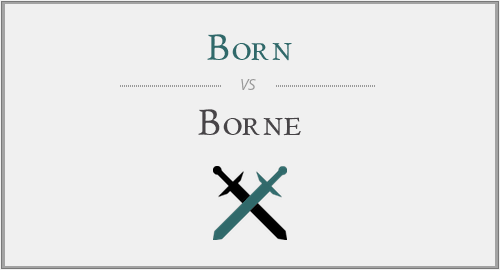An African-born man lost everything when his predictions were not borne out in reality.
Homophones are a pair of words that have the same sounds, same or similar spellings but entirely different spellings. These close sounds and spellings give rise to a lot of confusion among writers as they mistake one word for its homophone which changes the meaning of the whole sentence. Born and borne are also homophones of each other and are a source of confusion for your writers and beginners of English language. In this article we will discuss their meanings, origins, usage along with the help of examples to help you understand and distinguish both words.
Origin:
Born originated from Old English boren, past participle of beran which means ‘to bear’. Borne however, originated from Old English beran, of Germanic origin, from an Indo-European root shared by Sanskrit bharati, Greek pherein, and Latin ferre.
Born as adjective:
Born is a very common English word that is used as an adjective and implies the meaning of existing as a result of birth. She was born in England. Having a specific nationality is also described by the adjective born as in a German-born philosopher dedicated his whole life to finding a deeper truth. When describing a person who have natural ability to do a particular job, born as an adjective is employed. His fast reflexes shows that Alan is a born soldier. Born is also used in the sense of relating to people or a person that is perfectly suited or trained to do a particular job.
Some men born to rule.
Born is also used to describe an organization, movement, or idea brought into existence at some particular time. My company was born on 31st January, 1998. When something or someone is existing as a result of a particular situation or feeling, we say that it is born.
His work is born of despair.
Borne as adjective:
Borne too, is used in English language as an adjective, which increases the chance of misusing it for the other born. It describes the action of being carried or transported by the thing specified.
Waterborne bacteria are the main cause of diarrhea in rural area.

Borne is also used as a part participle of the verb bear which means to carry something be it a physical object, mark, feature, title or manners. Steamboats bear the traveler out of Kerrerra Sound. Many of the papers bore his flamboyant signature. He bore the surname Tille. She bore herself with dignity. Another meaning of bear is to support of carry the weight of something. These walls cannot bear a stone vault.
All these meanings of bear become the meanings of borne in past participle sense except for giving birth.
Examples:
The mosquito-borne Rift Valley fever virus has been linked to miscarriage in humans. (ScienceDaily)
Tick-borne infections are widespread throughout Europe. (Forbes)
States are starting to more closely examine custody arrangements for children born out of marriage, which have traditionally favored mothers, either by law or default, to give fathers a greater role in raising their children. (The Huffington Post)
A Scottish-born knight working in the US who pioneered the development of molecular machines is to share the Nobel Prize in Chemistry. (The Daily Mail)
All costs associated with this recall will be borne by Toyota and not our customers. (RTE)
It might equally be surmised that his 50-year silence was a ‘holy silence,’ born of the desire to live quietly and out of public view. (Spiked Online)
Born or Borne:
If you say that your teacher is a born educator, it means that he or she has an innate talent for passing on knowledge. You’re saying that your teacher was born to be a teacher. This is why you can’t write that your teacher is a borne educator. Unless he or she likes to be carried around, that is. Borne with an e at the end is used in all senses the verb bear is used except for giving birth.




Have a discussion about this article with the community:
Report Comment
We're doing our best to make sure our content is useful, accurate and safe.
If by any chance you spot an inappropriate comment while navigating through our website please use this form to let us know, and we'll take care of it shortly.
Attachment
You need to be logged in to favorite.
Log In